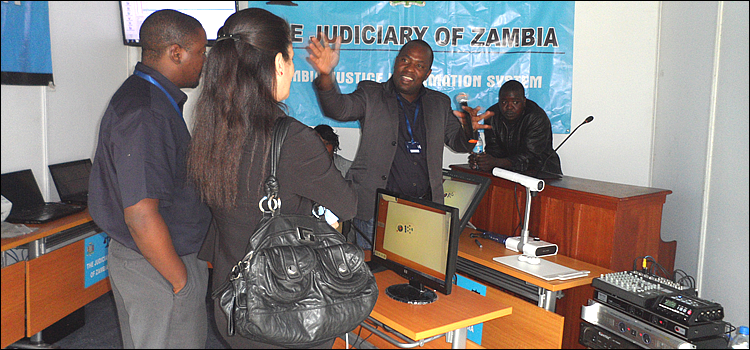Digitalization of court records is an intervention aimed at addressing issues of missing court case records. With this intervention, every physical record has an equivalent electronic version which can be reproduced should the physical file go missing.
This has significantly reduced complaints of missing case records in jurisdictions where this system has been deployed.
The table below highlight court registries that have been computerized as at 31st December 2019:
Lusaka
| Registry | Records Scanned | |
| 1. | Supreme Court Civil Registry | 5,276 |
| 2. | Supreme Court Criminal Registry | 1,601 |
| 3. | Constitutional Court Registry | 170 |
| 4. | Court of Appeal Civil Registry | 1,683 |
| 5. | Court of Appeal Criminal Registry | 637 |
| 6. | High Court Commercial Registry | 7,178 |
| 7. | High Court Principal Registry | 31,868 |
| 8. | High Court Criminal Registry | 5,462 |
| 9. | High Court Industrial Relations Division Registry | 2,652 |
| 10. | High Court Family Division Registry | 1,884 |
| 11. | Subordinate Court Civil Registry | 19,044 |
| 12. | Subordinate Court Criminal Registry | 18,825 |
| 13. | Small Claims Registry | 2,082 |
Kitwe
| Registry | Records Scanned | |
| 1. | High Court Civil Registry | 6,642 |
| 2. | High Court Criminal Registry | 985 |
| 3. | High Court Commercial Registry | 133 |
Ndola
| Registry | Records Scanned | |
| 1. | High Court Civil Registry | 5,898 |
| 2. | High Court Criminal Registry | 1,811 |
Each computerized courtroom has the following installed equipment:
Projector: Used to display court exhibits to public gallery;
LCD Screens: Used to display proceedings and exhibits to the bench and the bar;
Public Address System: Consisting of microphones, speakers, mixers and amplifiers used to increase audibility in the court;
Audio Recorder: Used to record court proceedings;
Computer: Used for submission of electronic exhibits in various formats on CD, DVD, USB Drives or SD Cards;
Document Camera: Used to capture, display and present physical exhibits in court;
Annotation Monitor: Used to visually highlight important aspects of exhibits being presented in court.
Self-Service Kiosks, Causelist Displays and Electronic Attendance Systems have also been implemented in some stations
The following are the courtrooms that have computerized under this programme:
Lusaka
Supreme Court – 2 Courtrooms
High Court – 4 Courtrooms
Magistrate Court Complex – 2 Courtrooms
Industrial Relations Court – 1 Courtroom
Kitwe
High Court – 2 Courtrooms
Ndola
High Court – 1 Courtroom
Magistrates Court – 1 Courtroom
This has significantly reduced the lead-time it used to take adjudicators to write judgments as proceedings taken in court are now made available just hours after hearing.
Previously, proceedings were handwritten and in most cases took several weeks to transcribe and error-correct before they were made available to adjudicators.

